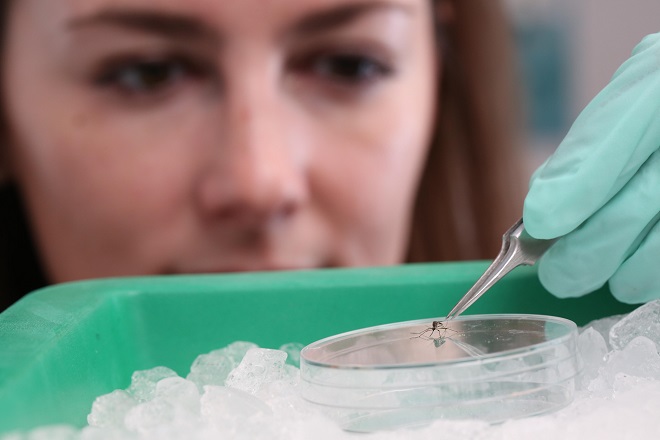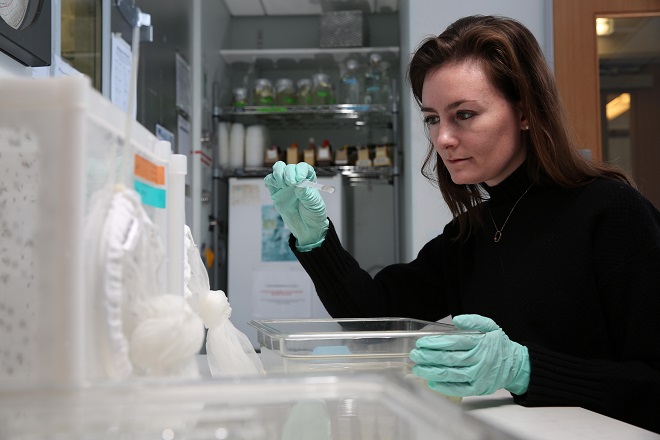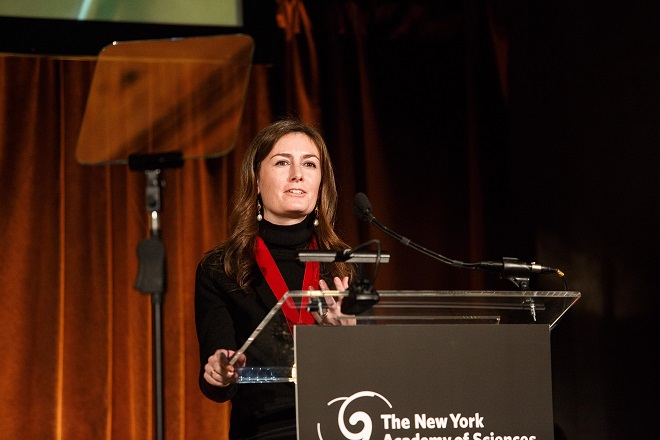
Credit: Wikimedia [By Muhammad Mahdi Karim - Own work, GFDL 1.2] https://commons.wikimedia.org/w/index.php?curid=9556152
When 2019 Blavatnik Regional Award Winner, Laura Duvall, PhD, started her postdoctoral research at The Rockefeller University under the mentorship of Leslie Vosshall, PhD, – herself a Blavatnik Award Winner – Duvall was not expecting to study mosquitoes. In graduate school she had studied circadian rhythms in the fruit fly. However, Vosshall had just started a new chapter in her research program, which focused on mosquito behavior. This research topic posed a great challenge to Duvall as both the model organism, the mosquito, and the behavior, blood feeding, were completely new to her. However, Blavatnik Scholars do not shy away from a challenge.

Credit: The Rockefeller University
Upon joining the lab, Duvall sought to understand the neurological circuits that drive mosquito blood feeding and breeding behavior. The goal? If we can intervene in ways that mosquitoes feed on humans, or the ways that mosquito populations grow, we can design new ways to control mosquito populations, and stop the spread of mosquito-borne diseases such as Zika and dengue.
As it happens, these questions are highly intertwined. Only female mosquitos consume “blood meals” (i.e. bite and consume blood from humans or other animals); these blood meals provide the nourishment they need to mature and lay their eggs. After a single blood meal a female will not bite for several days. Duvall wanted to understand the neural system that signals to females to not feed again.
Through the use of behavioral, molecular, genetic, and pharmacological techniques, Duvall identified a molecule called NPY-like receptor 7 (NPYLR7) that is activated when a female consumes a blood meal. Activation of this receptor sends a signal that effectively blocks the mosquito’s attraction to find and bite humans. Duvall’s identification and administration of drugs that activate NPYLR7 prevented mosquitoes from consuming blood meals even if they had not previously fed.
Similarly, Duvall also identified the molecular mechanisms that male mosquitoes use during mating to manipulate female breeding behavior. Mosquitos are predominantly monandrous, meaning that females will only mate once with a single male. Duvall discovered that males transmit the molecule, Head peptide I (HP-I), to females during mating. This peptide and its associated receptor that is found in the female results in females refusing to mate with another male. With the use of CRISPR, Duvall created male mosquitoes that fail to produced HP-I. Although these males were able to successfully mate, they failed to ensure paternity since the female would mate with other males.
Now an Assistant Professor at Columbia University, Duvall is continuing her research on the neurobiology of mosquito behavior, looking for ways to control the world-wide mosquito population and prevent disease spread. To this end, she now plans to test her findings in a new species of mosquito, Ae. Albopictus, which can also carry Zika and dengue but can survive in cooler environments. This mosquito species is prevalent throughout the United States. Duvall wants to understand whether NPYLR7 regulates blood feeding in other mosquito species, especially since there are so many mosquito species that live in different regions. If Duvall finds that activating NPYLR7 in multiple mosquito species prevents blood feeding the impact of her research could ripple throughout the world.

Credit: The Rockefeller University
Understanding these molecular mechanisms behind mosquito feeding and breeding offer multiple potential interventions to reduce mosquito populations and stop the spread of disease. Duvall’s search for understanding the neurobiological basis of mosquito feeding and breeding behavior is far from over. Recently, the Beckman Foundation announced Duvall as one of their 2020 Beckman Young Investigators, providing research funding to kick-start her new lab.
So, as you light citronella-scented candles and cover yourself with bug spray this summer, remember that you are not alone in your battle against mosquitoes. Laura Duvall is fighting tirelessly by your side, and a world without mosquito-borne diseases could be a reality.

Credit: The New York Academy of Sciences